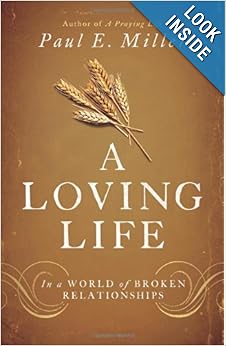
A Loving Life: In a
World of Broken Relationships by Paul Miller
Some authors just get it.
They seem to inhabit a text for so long that what comes out in their
writing is a deep wisdom that is beyond their years. Paul Miller is one of those authors for me,
and his new book called A Loving Life is a wellspring of refreshment for a
weary soul. This new book takes the book
of Ruth as its guide and seeks to delineate what a loving life might mean for
Ruth, Boaz, and Israel, but also for you and me. Rather than just a straightforward commentary
on the arcane features of the texture, Miller gets into the psychology of the
characters and the transformative nature of love flowing out of this wonderful
story.
Primary to his book is the understanding and application of hesed love. In chapter 2, Miller writes, “Sometimes hesed is translated “steadfast love.” It
combines commitment with sacrifice. Hesed
is one-way love. Love without an exit strategy. When you love with hesed love, you bind yourself to the
object of your love, no matter what the response is. So if the object of your
love snaps at you, you still love that person.” (25) The motivation behind hesed love is not a win
and then get out strategy but an all in approach. Much like that old game of hokey pokey when
the participant puts his whole body in and shakes it all about, hesed love is
jumping one’s whole self in love no matter the response of the other
person. Naomi is placed right in the
middle of the lives of Ruth and Orpah and asks God to bless them with a hesed
love. Paul writes this of Naomi’s
character, “Naomi gives Ruth and Orpah freedom, marriage, and children, and
takes on her already broken life, loneliness, and poverty. By giving up what
little hope she has left, she gives them a hope and a future. By deepening her
own death, she offers them a reason for living. That kind of exchange
anticipates Jesus’s death, where he takes our sin and gives us his gift of
acceptance, righteousness, and purity. Substitution is the structure of love.”
(27) This gospel story is evident in
giving up life so that it might be returned.
Naomi in effect is passing on the hesed love she has received from God
to her daughter’s-in-law. There is a
beautiful picture here of not only the later story of Jesus but of the way the
Christian should love his family, neighbor, and those around him.
In a later chapter we see Boaz’s hesed of Ruth as she seeks
to glean in the fields. He give her
seven commands that are very important to the story. Miller writes, “Boaz’s words are carefully
crafted to care for Ruth. The first five commands all say the same thing with
slightly different nuances. For Ruth, a new person on a new job in a new
culture, each repetition deepens the reassurance and the safety. In effect,
Boaz is telling her, “Do not even think about leaving this field.”6 By the time
he is finished, Ruth realizes he means it. Boaz’s insistent generosity is a
rare jewel.” (87) For Ruth, a
foreign woman in a foreign land with no money or name to show for herself, her
situation was dire indeed. Yet, Boaz is
generous to the utmost by providing her food to glean, women to watch over her,
and protection from any would be male looking for sex. Miller goes onto comment about how purity was
a big deal in ancient Israel although not for today’s culture. We notice that Boaz doesn’t trust young men
and the same is not different today, for young men are not looking at a woman’s
heart but her body. The generosity and
beauty of Boaz’s care for Ruth is indicative of the way he seeks after God and
the state of his heart.
This book was an extraordinary one. You won’t want to miss it. With deep wisdom, insightful analysis, and
gospel flow to it, Paul Miller has penned a wonderful book on the story of
Ruth.
Thanks to Crossway for the copy of this book in exchange for
an honest review.
Comments
Post a Comment